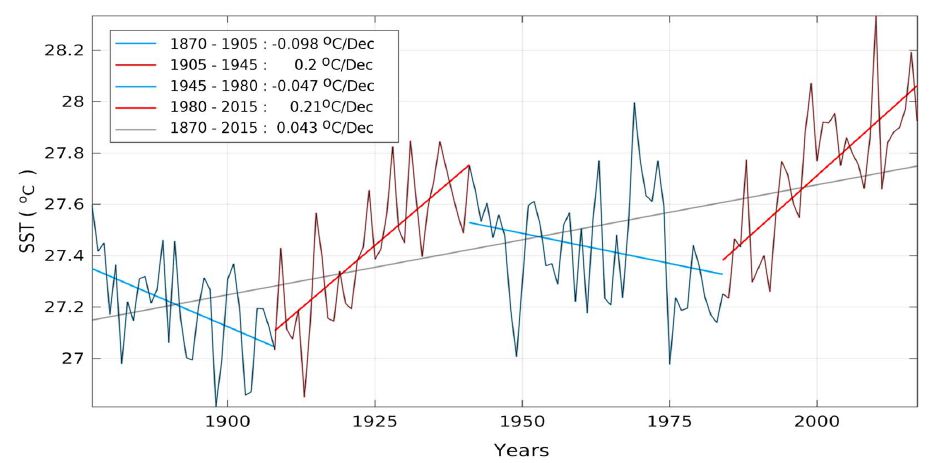Vor sieben Jahren schlugen wir in unserem Buch „Die kalte Sonne“ vor, Ozeanzyklen für Mittelfristprognosen einzusetzen. Das Klimaestablishment war damals strikt dagegen. Heute haben sich die Zeiten zum Glück geändert. Ein Team um George Krokos analysierte am 15. März 2019 in den Geophysical Research Letters die Temperaturentwicklung des Roten Meeres, welches sich in den letzten Jahrzehnten spürbar erwärmt hat. Die Forscher setzten dies in den Langfrist-Kontext und erkannten eine starke Korrelation mit dem 70-jährigen Ozeanzyklus der AMO (Atlantischen Multidekadenoszillation). Da die AMO nun ihren Scheitelpunkt erreicht hat, erwarten Krokos und Kollegen nun eine Abkühlung des Roten Meeres in den kommenden drei Jahrzehnten. Hier der Abstract des Papers:
Natural Climate Oscillations may Counteract Red Sea Warming Over the Coming Decades
Recent reports of warming trends in the Red Sea raise concerns about the response of the basin’s fragile ecosystem under an increasingly warming climate. Using a variety of available Sea Surface Temperature (SST) data sets, we investigate the evolution of Red Sea SST in relation to natural climate variability. Analysis of long‐term SST data sets reveals a sequence of alternating positive and negative trends, with similar amplitudes and a periodicity of nearly 70 years associated with the Atlantic Multidecadal Oscillation. High warming rates reported recently appear to be a combined effect of global warming and a positive phase of natural SST oscillations. Over the next decades, the SST trend in the Red Sea purely related to global warming is expected to be counteracted by the cooling Atlantic Multidecadal Oscillation phase. Regardless of the current positive trends, projections incorporating long‐term natural oscillations suggest a possible decreasing effect on SST in the near future.

Abbildung: Temperaturentwicklung des Roten Meeres. Daten: Hadley Centre. Abbildung: Krokos et al. 2019